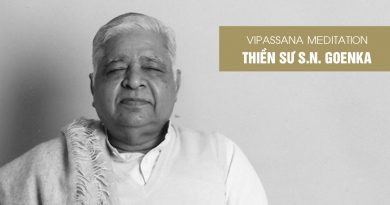The Essence Of Compassion
(Following discourse was given by Mr. S. N. Goenka)
Compassion (karuṇā) is a very noble state of the human mind. Like selfless love (mettā), sympathetic joy (muditā) and equanimity (upekkhā), compassion is also a brahmavihāra (sublime state of mind).
Merely discussing compassion or praising it is far away from the practice of true brahmavihāra. It is good to accept compassion at the intellectual level as an ideal sublime state. But this is also far away from true brahmavihāra.
Brahmavihāra means the nature of a brahma (the highest being in the order of beings). It is the practice of superior qualities, the practice of Dhammic qualities. Only when the mind is suffused and overflows with such brahmic qualities can we call it brahmavihāra.
The mind can overflow with compassion as well as mettā, muditā and upekkhā only when the mind is completely free from all defilements at the deepest level. This purity of mind and the resultant sublime states born out of it is the fruit of practice of Dhamma.
What is the meaning of living a Dhamma life? It means living a life of morality (sīla), that is, to abstain from performing any vocal or physical action that will disturb the peace and harmony of others and harm them.
In order to live a moral life, it is necessary to have complete mastery over one’s mind. For this, it is necessary to practice concentration of mind (samādhi) with a neutral object of meditation. A neutral object of meditation neither generates rāga (attachment) nor dosa (aversion). It is based on direct experiential truth and is free from ignorance.
However, it is not sufficient to concentrate one’s mind with the help of such a neutral object of meditation. It is necessary to develop wisdom (paññā) at the depths of the mind on the basis of direct experience and to become established in this experiential wisdom. By this practice it is possible to eradicate the habit-pattern of the mind of reacting blindly with craving and aversion.
As we gradually learn to recognize and weaken this habit of blind reaction, the old accumulated defilements are eradicated and new ones do not arise. Ultimately, the mind is completely freed of all defilements and becomes pure. Then the mind is naturally filled with the brahmic qualities of mettā, karuṇā, muditā, and upekkhā.
As long as the old stock of defilements is present in the mind and new defilements are added to it, it is not possible for the brahmavihāras to arise in the mind. Ego plays a role in the arising of all defilements. As long as the mind is ego-centred, self-centred, one may talk about the four brahmavihāras and praise them highly, but one is not able to cultivate them.
The more the mind becomes free from defilements the more the development of the four brahmavihāra. When a meditator is fully liberated, he dwells continuously in the pure brahmavihāras. Therefore, for development of the brahmavihāras of mettā, karuṇā, muditā, and upekkhā, it is absolutely essential to become established in sīla, samādhi and paññā.
Source: https://www.vridhamma.org







